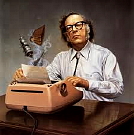
By Isaac Asimov
This article was provided in its original form by wife of Isaac Asimov, Dr. Janet Jeppson Asimov (used with permission from the estate of Isaac Asimov). An edited version appeared in the Los Angeles Times on March 31, 1989, which can be viewed here.
For a long time now, scientists have been concerned about the low level of scientific and mathematical instruction in American schools. Recent reports in 1988 and 1989 are unanimous in indicating not only that American students are scientifically and mathematically illiterate, but that they are more so than is true of students in any other industrial society studied.
This is depressing in the extreme. The United States is the scientific leader of the world. Partly this may be due to the steady influx of scientists who were educated in other parts of the world. During the 1930’s, Nazi oppression drove numerous scientists to Great Britain and the United States, and they were a key factor in the development of the nuclear bomb — a development widely touted in the United States as based on “Yankee know-how.” Except that virtually all the Yankees had foreign accents.
And where do we stand today? Must we depend on the continued maintenance of our scientific lead of foreign imports?
What meaning is there in American democracy in this case? Increasingly, our leaders must deal with dangers that threaten the entire world, where an understanding of those dangers and the possible solutions depend on a good grasp of science. The ozone layer, the greenhouse effect, acid rain, questions of diet and of heredity – all require scientific literacy. Can Americans choose the proper leaders and support the proper programs if they are scientifically illiterate?
The whole premise of democracy is that it is safe to leave important questions to the court of public opinion — but is it safe to leave them to the court of public ignorance?
Let us take an example. In July, 1988, Jon Miller of the Public Opinion Laboratory at Northern Illinois University conducted a telephone poll of 2,041 adults and asked each about 75 questions on basic science. The results of the questionnaire showed that almost 95 percent of those questioned were ignorant of basic and simple scientific facts and had to be considered scientifically illiterate. There seemed a popular impression, for instance, that laser beams were composed of sound waves (rather than light waves) and that atoms are smaller that electrons (rather than the other way around).
This might seem to many to be esoteric, but consider this. Twenty-one percent of those questioned were of the opinion that the Sun revolved around the Earth (rather than vice versa) and an additional 7 percent didn’t know which went around which.
Considering that it is now four centuries that science has been unanimous over the fact that the Earth goes about the Sun, how is it possible that a quarter of those asked didn’t know about it? To my mind, there are three possibilities:
- Those who didn’t know had never gone to school and had never read any book that dealt with science in any significant way.
- Those who didn’t know had indeed gone to school and had read some books but paid no attention whatever.
- Those who didn’t know had gone to school and had read books and had paid attention but hadn’t been properly taught.
To me the first two possibilities are unthinkable, and I am forced to consider the third.
That Americans aren’t properly taught is all too likely considering the fact that a great many “teachers” must be as scientifically and mathematically illiterate, as the general public. Yet how can any teacher, however poorly prepared, not teach the kids that the Earth goes around the Sun?
Well, there is a passage in the Bible that describes a flight between the Israelites under Joshua and the Gibeonites. The Israelites were winning, but it seemed the Gibeonites might escape under the cover of darkness. To complete the victory, Joshua therefore commanded “Sun, stand thou still upon Gibeon… And the sun stood still… and hasted not to go down about a whole day.”
Now how can Joshua have ordered the Sun to stand still and how could the Sun have proceeded to stand still, if it weren’t moving to begin with? These verses were used by people in the 1500s and 1600s to fight against the notion that the Earth was moving around the Sun. They kept quoting the passage in Joshua.
In actual fact, this story was told when everyone in the world thought the Sun did move. We have learned better since, that’s all.
Nevertheless, there are millions of people in the United States who still firmly believe that every work of the Bible is inspired and absolutely true; that the Sun is moving and Joshua did command it to stand still, and it did stop moving temporarily.
Perhaps that means that the Sun goes round the Earth, either out of pious ignorance or out of the dreadful fear that they will be fired if they don’t. And perhaps that is why so many Americans are ignorant of so vital a point.
Imagine the harm things like this can do to our country!
Dr. Isaac Asimov is one of the most prolific writers of all time, having written or edited over 500 books and 9,000 letters. He is best known as the author of I, Robot and the Foundation series. He was the 1984 Humanist of the Year and honorary president of the American Humanist Association from 1985 until his death in 1992.
